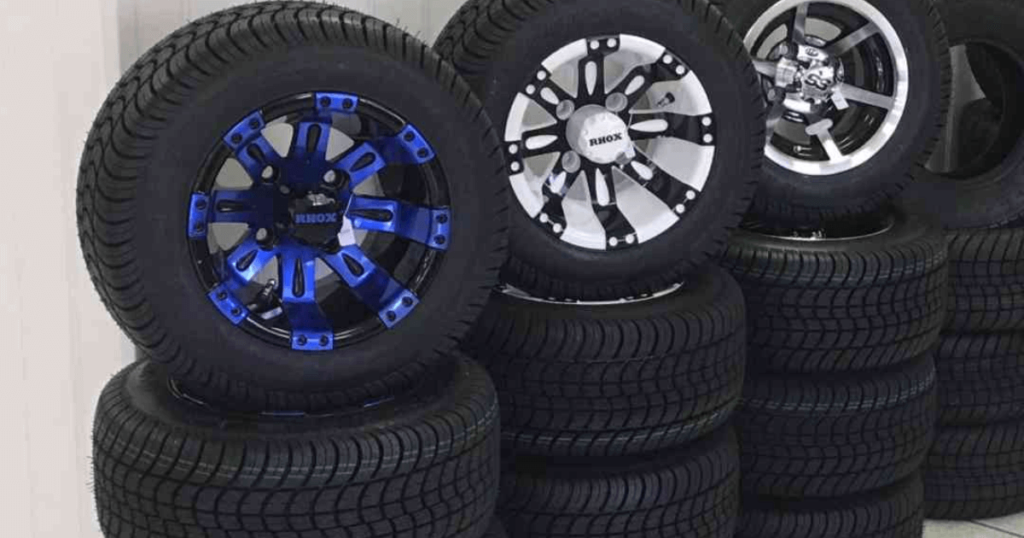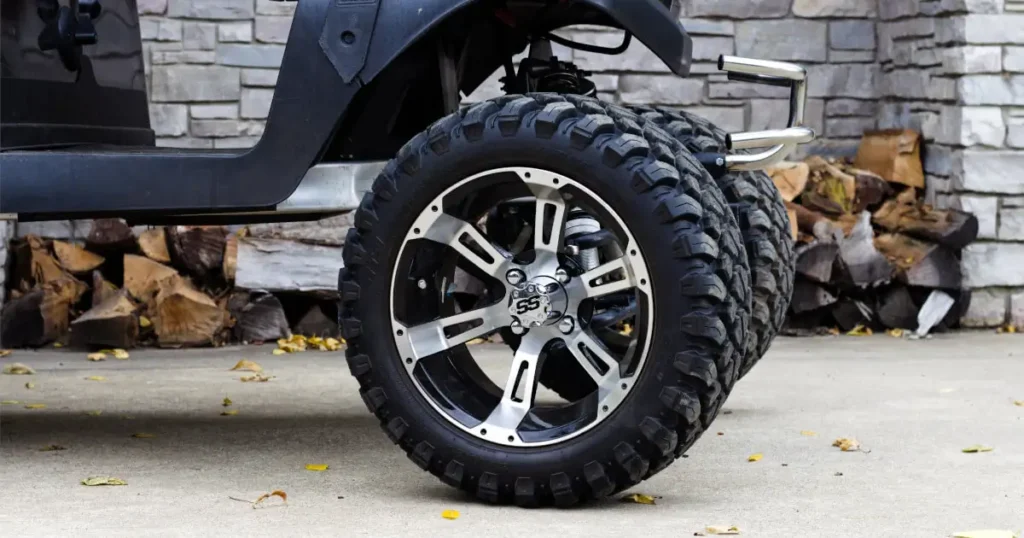Understanding the difference between golf cart wheels and tires is critical for everyone who owns or operates a golf cart. While they operate together to keep your cart moving, they have unique functions. This book delves deeply into the subject of golf cart wheels and tires, describing their functions, types, and how to select the best ones for your requirements.
Golf Cart Wheels

Golf cart wheels are the metal elements that support and connect the tires to the axle. They come in a variety of forms and materials, with each providing unique benefits. Here’s a close look:
Materials: Steel wheels are the most popular since they are inexpensive and durable. Aluminum wheels are lighter and perform better, but they cost more. Plastic wheels may also be found on less expensive carts.
Styles: There are several different types available, ranging from the traditional spoked design to more modern solid wheel possibilities. Spoked wheels allow for greater brake ventilation, although solid wheels provide a more streamlined appearance.
Effect on Performance: Wheels can impact a golf cart’s weight, handling, and ride quality. Lighter wheels typically increase acceleration and handling, but heavy wheels provide greater stability.
Are Golf Cart Wheels Universal Across Brands?
Generally, Golf cart wheels are not interchangeable between brands. Different manufacturers utilize different bolt patterns to fasten the wheels to the axles. This guarantees compatibility with their special chassis design.
Wheel Bolt Patterns
The wheel bolt pattern refers to the number of lugs on the wheel as well as the diameter of the imaginary circle formed by them. It is critical to select wheels with a bolt pattern that matches your cart’s model. Mismatched patterns can cause poor fitting, vibration, and possible safety hazards.
Can You Set Car Wheels On A Golf Cart?
No, you usually cannot put vehicle wheels on a golf cart. Car wheels are built to withstand far higher speeds and loads than golf carts. They may not fit the bolt pattern, have the incorrect offset, or degrade the cart’s stability and handling.
Read More:
What is the Golf Cart Wheel Offset?
Wheel offset is the distance between a wheel’s mounting surface and its centerline. A positive offset means the mounting surface is closer to the wheel’s outside border, whereas a negative offset places it closer to the center. Offset influences track width (the distance between the wheels), scrub radius (how the tire interacts with the steering knuckle during a turn), and overall handling.
Can You Put Bigger Wheels On A Golf Cart?
Yes, you can put larger wheels on a golf cart, but there are some considerations. Larger wheels can increase ground clearance, give a more aggressive appearance, and possibly improve handling. They can also:
Heavier wheels might limit acceleration and performance. Larger wheels may shift the cart’s center of gravity, affecting handling.
To allow larger wheels, consider modifying the fenders. Additionally, larger wheels can increase stress on the motor and axles.
Before installing larger wheels, ask a golf cart specialist to confirm they are suitable with your cart and will not affect its performance or safety.
How Fast Will a Golf Cart Go With Bigger Tires?
Bigger tires will not necessarily make your golf cart faster. While wider diameter tires can marginally boost theoretical top speed due to increased circumference, speed is primarily limited by the motor and transmission. In most circumstances, the performance loss from larger tires may not be worthwhile.
Aslo Read:
Golf Cart Tires: The Ultimate Guide
Now that we’ve covered wheels, let’s look at golf cart tires. Tires are rubber components that provide traction, cushioning, and control to your cart. Choosing the correct tires depends on how you want to utilize your cart.
What are the different Kind of golf cart tires?
There are three major varieties of golf cart tires, each designed for a distinct terrain:
All-terrain Tires: These tires have aggressive treads and deep lugs, making them excellent for use on rugged terrain, dirt roads, and uneven surfaces. They provide excellent traction, but may produce more noise on paved roads.
Turf tires: Turf tires are designed for smooth surfaces such as golf courses and paved paths, and their smooth, shallow treads prevent turf damage while providing a quiet ride.
Street tires: These tires focus performance on paved surfaces. They have a low profile and smooth tread patterns for improved handling, speed, and quieter riding.
What is the standard size for golf cart tires?
Here’s an overview of the information encoded in a golf cart tire size:
The initial number (for example, 18): This is the tire’s overall diameter in inches when placed on the wheel.
The letter (for example, x): This separates the diameter and width.
The second number (e.g., 8.50): This shows the tire’s section width in inches.
The final number (e.g., 10): This represents the wheel’s rim diameter in inches.
Common Standard Golf Cart Tire Sizes
The most typical size for stock golf carts is 18×8.50-8. It provides a nice mix between performance and ride quality.
05/50-10: This is another popular size, especially on raised carts. It has a slightly larger diameter and broader section width, resulting in greater handling and ground clearance.
215/50-12: This larger size is commonly used on raised carts for better off-road performance and a more aggressive appearance.
How to Select the Right Golf Cart Tires
Choosing the correct golf cart tires is determined by your cart’s principal purpose. Here are some things to consider:
Terrain: If you typically utilize your cart on paved surfaces, street tires are your best bet. All-terrain tires are ideal for off-road excursions because they give higher grip. Turf tires are best suited for smooth, maintained courses.
Speed: Low-profile street tires perform well at greater speeds. However, for slower speeds and more comfort, all-terrain or turf tires may be more appropriate.
Ride Quality:Turf and all-terrain tires with smooth tread patterns offer the quietest and smoothest ride. Aggressive all-terrain tires may provide more traction but are louder.
Rim Size: Ensure that the tires you select are suitable with the rim size of your wheels.
Installing the New Golf Cart Tires
Mounting and balancing golf cart tires is a specialised task. It is strongly advised to have a professional tire service handle the installation to ensure proper safety and performance. They have the necessary equipment and knowledge to guarantee that the tires are properly installed, filled to the recommended pressure, and balanced for a smooth ride.
How To Measure Golf Cart Tires
There are two major methods for measuring your golf cart tires:
By reading the sidewall: Tire sizes are normally displayed on the sidewall of the tire. Look for a sequence of numbers and letters, such as “18×8.50-10.” This will supply all of the required information on the tire’s size.
Using a Tape Measure: If the sidewall markings are faded or difficult to read, use a tape measure to obtain approximate measurements. Measure the tire’s diameter from one sidewall to the other, across the tread. Then, measure the tread width from sidewall to sidewall.
When to Replace Golf Cart Tires?
Several factors suggest that it is time to replace your golf cart tires:
Treadwear:The most common indicator is worn out tread. Look for the tread wear indicators (little bars) that are molded into the tread grooves. Once the tread has worn down to the level of these signs, the tires will no longer provide enough traction and should be replaced.
The age of the golf cart tire: Even with modest use, tires degrade over time due to weather and sunlight exposure. It is suggested to replace tires every five to seven years, regardless of tread depth.
Golf Cart Tire Performance: Do you notice any changes in handling, vibration, or difficulties sustaining air pressure? These could be indications of tire wear or degradation, necessitating a professional assessment.
How Long do Golf Cart Tires Last?
The life span of golf cart tires is determined by a variety of factors, including usage, terrain, and maintenance. Under normal use on paved surfaces, well-maintained tires can last five to seven years. However, excessive off-road driving or overloading the cart might significantly reduce its longevity. Regular inspections and adequate care are critical to extending tire life.
Final Thoughts on the Difference Between Golf Cart Wheels and Tires.
Understanding the differences between golf cart wheels and tires allows you to make better decisions about your cart’s performance and appearance. Choosing the correct wheels and tires for your needs ensures a safe, comfortable, and enjoyable ride on the golf course, neighbourhood trails.

